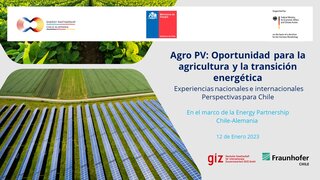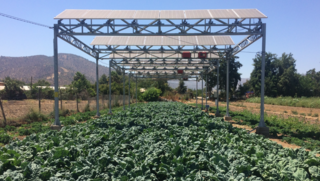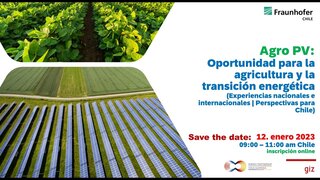AgriPV Oportunidad para la agricultura y la transición
Opportunity for Agriculture and the Energy Transition
- The Energy Partnership Chile-Germany of GIZ Chile and Fraunhofer Research Chile presented the opportunities and challenges of Agro-PV in Chile and worldwide as a solution for adaptation and mitigation of the effects of climate change in the agricultural sector.
- The webinar with more than 120 participants from different sectors took place on Thursday 12 January and was attended by representatives of the Ministry of Energy and the Ministry of Agriculture.
Chile, January 2023. Chile is one of the countries most vulnerable to climate change; drought and changes in rainfall patterns are some of the effects that the agricultural sector must face and consider for its future development. According to the National Institute of Statistics, the surface area of Chilean wheat production has been reduced from 400,000 to approximately 200,000 hectares in the last 20 years. Moreover, according to Jaime Giacomozzi, Climate Change Mitigation Analyst at the Office of Agricultural Studies and Policies of the Ministry of Agriculture, "agri-food economy is responsible for around a quarter of global greenhouse gas emissions".
Fraunhofer Research Chile defines AgroPV, or AgriPV, as a system that integrates photovoltaic panels into farming lands to combine agricultural production and clean energy generation on the same piece of land. An AgroPV system can increase land use efficiency and enable other positive synergistic effects for agriculture, such as climate protection of sensitive crops and improved water use efficiency. Worldwide, there is already around 14 GWp of AgroPV capacity installed.
Chile has three pilots of this technology that have been advised by the Fraunhofer Institute. These pilots are located in the central area, specifically in Lampa, Curacaví and El Monte. According to David Jung, researcher at Fraunhofer Research Chile, the results of analyses with microclimatic sensors were able to identify a striking impact on soil humidity, generating a 29% more humid surface because of partial shade.
In addition, Marco Aguilar, representative of Sobreterra and beneficiary of the AgroPV pilot in Lampa, shared his practical experience applying this type of system. He emphasised that; "we were able to see benefits for both the farmer and the crops, due to the partial shade, as the humidity is maintained, and the plant does not suffer so much stress. Also, the energy consumption is a plus in economic terms as we use packaging machines that work with cooling chambers 24/7 and we have seen a significant drop in the electricity bill."
The challenges of AgroPV
Tobias Winter, GIZ expert in India and director of the Indo-German Energy Forum (IGEF), underlined that one of the challenges is to correctly calculate the height of the PV systems so that they do not interfere with the movement of the machines. Another relevant point is the selection of an effective panel cleaning system, for example with micro-robotics. In the case of Chile, there are still barriers to be overcome to advance in the use of this technology, including legislation, calculating the profitability of such projects and more applied research.
Interested parties were invited to continue learning about this topic through a Q&A round. Download here
At the end of the webinar, attendees were invited to continue learning about this topic through a round table, for which you can register here.

Video: Agro PV: Oportunidad para la agricultura y la transición energética. Experiencias (inter)nacionales

Presentations (Spanish)
The Energy Partnership Chile-Alemania officially started in April 2019, wheen the German Federal Ministry of Economics and Climate Action (BMWK) and the Chilean Ministry of Energy (MEN) signed an Agreement of Cooperation. This Partnership has a full-time secretariat in Santiago de Chile operated by the GIZ (Deutsche Gesellschaft für Internationale Zusammenarbeit GmbH) which is the implementing body of this project.
